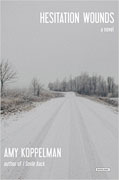Hesitation Wounds
Amy Koppelman
book reviews:
· general fiction
· chick lit/romance
· sci-fi/fantasy
· graphic novels
· nonfiction
· audio books
· author interviews
· children's books @
curledupkids.com
· DVD reviews @
curledupdvd.com
newsletter
win books
buy online
links
home
for authors
& publishers
for reviewers

 |
Hesitation Wounds Amy Koppelman The Overlook Press Hardcover 192 pages November 2015 |
|
In late January, the U.S. Preventive Services Task Force (not a federal government group) issued this report: all adult Americans ought to be screened by their GP for depression. (“Depression is among the leading causes of disability in persons 15 years and older,” states the report.) Certainly in northern New England, we can relate. Many of us have SAD – Seasonal Affective Disorder - as our skies are often gray. We don’t get enough sun.
Koppelman knows of depression. She admits in interviews that she has suffered much of her life; she is deeply concerned with issues of women’s mental health. Another of her novels, I Smile Back, was made into a film (Koppelman also is a screenwriter). That narrative revolves around a destructive woman trying to surmount her depression. And guess what? This latest novel is quite depressing to read. The first two lines of the novel give some clue of what is to come: “This is what I know. The people who love you leave.” Sadness aside, the book is extremely well-written in terms of language and structure, and it is sensitive. The thoughts and dialogue seem real to sad people’s experiences. Its storyline is unique and the chronology, shifting back and forth, is done skillfully so the reader doesn’t get lost in a time vacuum. The main story is about Dr. Susanna Seliger, a 40-something psychiatrist who almost 30 years ago lost her only sibling, Daniel, to a horrible death. They were teenagers. In the middle of her life, Susa is stuck somewhere between stages 2 and 4 in the Kubler-Ross hierarchy of grieving. Her brother was lively, handsome, a graffiti artist. The two had non-abusive parents. They were extremely close; they often got high together and discussed almost everything. In her psychiatric practice, a field chosen in great part because of her brother’s death, Susa treats those who are chronically depressed with electroconvulsive therapy (ECT) and in her life; she grieves for her brother, daily. “Memory keepers beware: there are no annotations. Time alters, what was becomes something else, and with more time it becomes something else yet again.” Her pain diminishes slightly, but does not leave her. “This is the dirty secret of my profession. Or perhaps it’s just one of my dirty secrets… As much time as I’ve spent trying to understand the human mind, I haven’t gained much perspective.” Shortly after his death, to help her cope with the overwhelming loss, Susa dated and almost married her brother’s best friend, Ray. That didn’t work out, nor do her ensuing relationships. The ending is somewhat bleak, but not like the beginning. Susa does assertively begin to rebuild her life and her shattered hopes for any relationship’s stability. She makes a huge leap of faith, and she begins to leave Daniel. When she visits his grave, she tells him, “… I’m getting better. Maybe one day I won’t cry at all.” She begins to act on a regained ability to love. For this reader, as I look at it again, the title continues to puzzle me. Does hesitation, hesitating to act, inexorably wound one? Or does the protagonist have hesitation wounds caused by her brother and the sorrow and occasional suicide of her patients? My guess is the first meaning is what the author intends; Susa feels she could have done more to physically (and psychologically) save her brother. And, as I do not have a sibling, the question of whether someone would realistically grieve a brother so deeply for more than 20 years, remains. It is outside my understanding. This novel should be immensely popular and successful. It hits many contemporary citizens where they live. Works about like people are often cathartic for readers. Like Jane Kenyon in her poignant poems of depression, published almost three decades earlier, Koppelman is obviously on to something. Originally published on Curled Up With A Good Book at www.curledup.com. © Deborah Straw, 2016 |
| Also by Amy Koppelman: |
|
|
|
 Click here to learn more about this month's sponsor! |
|
| fiction · sf/f · comic books · nonfiction · audio newsletter · free book contest · buy books online review index · links · · authors & publishers reviewers |
|
| site by ELBO Computing Resources, Inc. | |
 Of course, not all of us are depressed. Contemplative, yes. As are the characters in this new novel by Amy Koppelman. In her third novel,
Of course, not all of us are depressed. Contemplative, yes. As are the characters in this new novel by Amy Koppelman. In her third novel,